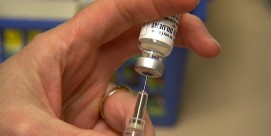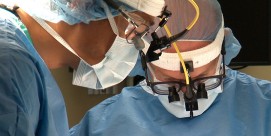BETTY ROLLIN: The Kingdom Hall of Jehovah's Witnesses in Cumming, Georgia: Justine and Gary LaClair are among the congregants. And they are among the 1.2 million Jehovah's Witnesses in the United States. The organization of Jehovah's Witnesses was begun in the late 19th century by a small group of Bible students in Pennsylvania.
JUSTINE LaCLAIR: We believe from the Bible that God has a name and it is Jehovah, and that his son, Jesus Christ is separate. His kingdom has been established in heaven and instead of everybody going to heaven when they die there will actually be a resurrection here on the earth and all of our loved ones will come back and we'll enjoy perfect life forever right here on earth. Where a lot of religions may teach things such as hell fire, immortality of the soul, and trinity, Jehovah's Witnesses don't believe those teachings. We take the Bible very literally and believe the Bible for what it is. We look for the truth in the Bible.
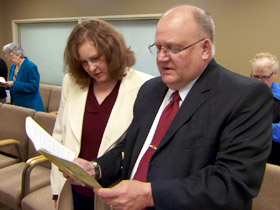
ROLLIN: One of the “truths” Witnesses believe in has to do with blood.
JUSTINE LACLAIR: In Genesis and again Leviticus, there's very specific scriptures that state that the blood is sacred and that life is in the blood and that belongs to God. So we want to respect that and be obedient to that. So that means Jehovah's Witnesses do not accept blood transfusions.
ROLLIN: They believe to do so would be a sin, a sin serious enough that many Church members would rather die than receive blood transfusions. This issue has been very much on the LaClairs' minds because in May, the 43 year old Justine was about to have surgery. She had a tumor in her skull which had to be removed. For this type of surgery most hospitals might have required a blood transfusion, which was unacceptable to Justine—and to her husband Gary as well.
GARY LaCLAIR: It's her decision obviously, but it makes it a lot easier if she had support and that's really my responsibility and I’m taking it seriously.
ROLLIN: The LaClairs found a solution to their problem in Englewood, New Jersey. Nearly 20 years ago the Englewood Hospital began a bloodless surgery program. The policy grew out of the need of Jehovah's Witnesses, and now it has become the hospital's preferred method of surgery for all patients.
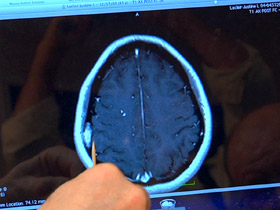
DR. ABE STEINBERGER (Neurosurgeon, Englewood Hospital): Do you see this thing here?
JUSTINE LaCLAIR: Yes.
DR. STEINBERGER: That's not supposed to be here. This is a tumor of some kind.
ROLLIN: Dr. Steinberger, who performed Justine's surgery, has become a firm believer in Englewood's avoidance of blood transfusions. For him it's just good medicine.
DR. STEINBERGER: The science seemed very real. The literature seemed to support it and once we started doing the operations, the results were great. The risks of giving blood in many cases outweigh the benefits of giving blood. There are risks of infections, there are risks of lowering the immune response of the patient, there are risks of giving the wrong kind of blood, errors can occur and if there's any way to avoid getting a blood transfusion, one is better off in general if they can avoid it.
ROLLIN: In any sense, do you feel the Jehovah's Witnesses have done medicine a service?
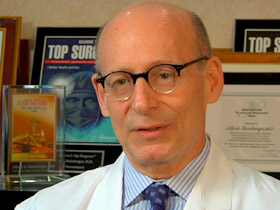
DR. STEINBERGER: Definitely. They definitely have done medicine a service.
ROLLIN: The key to successful bloodless surgery is preparation. Sherri Ozawa directs the Hospital's Bloodless Surgery program.
SHERRI OZAWA, RN (Clinical Director, The Institute for Patient Blood Management and Bloodless Medicine and Surgery): Many, many patients, estimates are as many 40 or 50% of patients come to surgery anemic. They don't have enough blood cells. Very simply, dealing with that ahead of time, helping to build those patients' blood up eliminates even the question of transfusion for many patients. We could perform even serious surgeries and even life threatening situations bloodlessly with much greater success than other people would have expected, even than we expected initially.
ROLLIN: And, there is the cost of blood.
SHERRI OZAWA: It's immensely expensive and if it's done for no good reason that is billions of dollars of waste in the healthcare system. It costs about $1100 to give one unit of blood. Not to buy it, to transfuse one unit of blood.
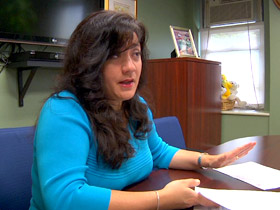
ROLLIN: When Englewood's program began in 1994 there were fewer than 10 hospitals offering programs for surgery without blood transfusions. Today there are about 150 and many more are in development.
There is more to successful bloodless surgery than preparation. At Englewood they practice precision surgery with minimal blood loss, and if a patient loses blood and has agreed before hand, the surgeon uses a technology that recycles the patient's own blood. Still there is a resistance among surgeons to bloodless surgery. Both Dr. Steinberger and Sherri Ozawa simply blame tradition and habit.
SHERRI OZAWA: The resistance is primarily behaviorally based. Physicians get about between 3 to 6 hours of training in transfusion science in medical school. They don't know a whole lot about it. So most of bloodless medicine or transfusion-free surgery really is education for clinicians in how to handle these situations without blood.
ROLLIN: Lately doctors from other countries have taken an interest in bloodless surgery, particularly in Africa.
SHERRI OZAWA: They are learning the techniques that we have learned from taking care of this specific population to use in their countries where either the blood supply is unsafe or unavailable.
ROLLIN: Justine's surgery was successfully performed on May 9th. She went home to Georgia two days later.
DR. STEINBERGER: Everything went very well, no problems. She's waking up from anesthesia. There was hardly any blood loss. Depending on how she feels tomorrow she can leave when she feels ready to go.
GARY LaCLAIR: You did a wonderful thing.
DR. STEINBERGER: Well, let's see how she does...
ROLLIN: For Religion & Ethics NewsWeekly, I'm Betty Rollin in Englewood, New Jersey.





